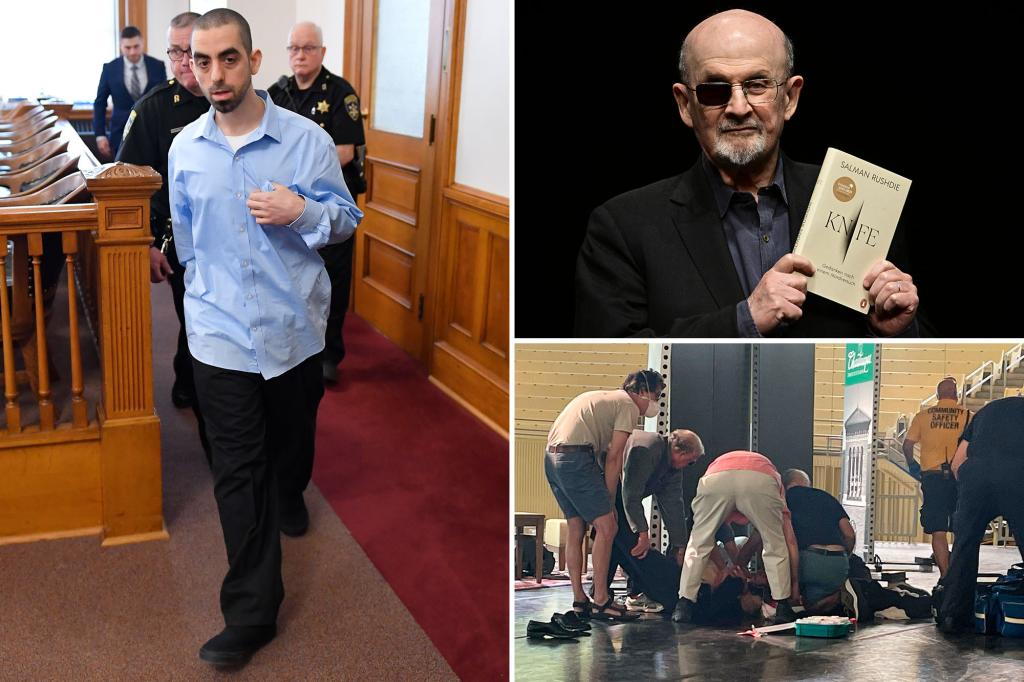World
Accused Salman Rushdie stabber Hati Matar says ‘Free Palestine’ as he heads into court

Salman Rushdie Stabbing Suspect Hadi Matar Shouts "Free Palestine" in Court
Introduction
The case of Salman Rushdie, the renowned author who was stabbed in August 2022 during a literary event in New York, has taken a dramatic turn. The suspect, Hadi Matar, a 24-year-old man from New Jersey, made headlines again on Monday when he walked into the courtroom at the Chautauqua County Courthouse in Mayville, New York, and shouted, "Free Palestine." This incident has sparked widespread media attention and public interest, as it brings to the forefront the motivations behind the violent attack on Rushdie and the broader context of the case.
The Attack on Salman Rushdie: A Grim Reminder of the Power of Words
On August 12, 2022, Salman Rushdie, the celebrated author of works such as Midnight’s Children and The Satanic Verses, was stabbed multiple times while attending a literary seminar at the Chautauqua Institution in upstate New York. The attacker, identified as Hadi Matar, stormed the stage and managed to inflict at least 10 stab wounds on Rushdie before being subdued by security personnel. The attack left Rushdie with severe injuries, including blindness in one eye, nerve damage, and liver damage. The violence was a grim reminder of the enduring controversy surrounding Rushdie’s works, particularly The Satanic Verses, which has been the subject of intense debate and backlash in some Muslim communities since its publication in 1988.
Who is Hadi Matar? Unraveling the Motivations of the Suspect
Hadi Matar, the young man accused of attempting to murder Salman Rushdie, has been a subject of intense scrutiny and speculation. A resident of Fairview, New Jersey, Matar was 24 years old at the time of the attack. Little is known about his personal life, but investigators have reportedly found evidence suggesting that he was influenced by extremist ideologies, possibly linked to the broader Islamic extremist movements. Some reports indicate that Matar had expressed support for the Iranian Revolutionary Guard and had been radicalized online. However, these claims have not been officially confirmed, and Matar’s exact motivations remain unclear.
Matar’s decision to shout "Free Palestine" as he entered the courtroom on Monday has added another layer to the narrative surrounding the case. This phrase, often used to express solidarity with the Palestinian cause, suggests that Matar may have been motivated by a broader political or ideological agenda. It raises questions about whether the attack on Rushdie was a targeted act of violence inspired by a specific set of beliefs or a more general expression of anger and frustration.
"Free Palestine": The Suspect’s Statement and Its Implications
As Hadi Matar walked into the courtroom on Monday, he uttered a phrase that has become a rallying cry for many around the world: "Free Palestine." This statement, made in the context of a legal proceeding for a violent crime, has sparked a wave of reactions, from outrage to curiosity. Many are left wondering what this phrase signifies in relation to the attack on Salman Rushdie and whether it provides any insight into Matar’s mindset and motivations.
The phrase "Free Palestine" is a slogan commonly associated with the Palestinian liberation movement, which advocates for the rights and self-determination of the Palestinian people in the context of the Israeli-Palestinian conflict. While it is a phrase that resonates with millions of people worldwide, it is important to note that Matar’s use of it does not necessarily imply a direct connection between the Palestinian cause and the attack on Rushdie. Rather, it may indicate that Matar views his actions as part of a broader struggle against perceived injustices, whether real or imagined.
The Legal Proceedings: Hadi Matar’s Denial of Guilt
Despite the serious nature of the charges against him, Hadi Matar has pleaded not guilty to counts of attempted murder and assault in connection with the stabbing of Salman Rushdie. His decision to enter a plea of not guilty has set the stage for a potentially lengthy and complex legal battle. As the case progresses, the court will need to consider a wide range of factors, including Matar’s mental state at the time of the attack, his potential motivations, and the extent of the injuries inflicted on Rushdie.
The legal proceedings will also provide an opportunity for the prosecution and the defense to present their respective cases. The prosecution will likely argue that the attack was premeditated and that Matar acted with the intent to kill Rushdie, while the defense may seek to challenge this narrative by presenting evidence that could cast doubt on the allegations. Regardless of the outcome, the case is likely to have significant implications for debates surrounding free speech, extremism, and the role of ideology in violent acts.
Conclusion: The Broader Implications of the Attack
The stabbing of Salman Rushdie and the subsequent events surrounding Hadi Matar’s legal case have brought into sharp focus the complex interplay of ideology, violence, and free speech in the modern world. While the attack on Rushdie was a tragic and senseless act of violence, it also serves as a stark reminder of the enduring power of words to provoke, inspire, and divide.
As the legal proceedings unfold, the world will be watching closely to see how the case is handled and what insights it may provide into the motivations behind the attack. In the meantime, the case continues to spark important conversations about the limits of free speech, the dangers of extremism, and the need for greater understanding and empathy in a world that is increasingly polarized.
In the end, the attack on Salman Rushdie and the courtroom statement of Hadi Matar serve as a poignant reminder of the fragile nature of peace and the enduring challenges of addressing the root causes of violence. While justice must be served, the case also calls for a broader reckoning with the issues that may have contributed to this tragic event, in the hope of preventing similar incidents in the future.











